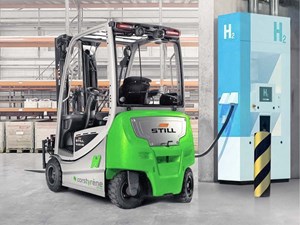News
Kion Group to develop and produce fuel cell systems for industrial trucks
The KION Group is expanding its H2 propulsion range. The global intralogistics group will soon develop and produce its own fuel cell systems for its industrial trucks. The company is going to invest more than €11 MM in this technology. The KION Group plans to launch its own 24 V fuel cell system for warehouse equipment to the market in spring 2023. Completion of the fuel cell portfolio is expected to follow in the coming years. This means that the KION brands will soon be able to offer their customers everything they need from a single source: the forklift, the fuel cells and the associated service.
“As of today, the KION Group will be the only manufacturer of forklifts and warehouse equipment in the European market to produce its own fuel cells, something that truly sets us apart,” said Rob Smith, CEO of the KION GROUP AG. “There is huge demand from our customers, and we hope that this technology will allow us to meet ever-increasing calls for intralogistics to become more resource-conscious and sustainable, while at the same time also meet demands for rapid refueling.”
The group plans to supply the first forklift trucks with its own fuel cell systems this year. The advantages of fuel cell technology are manifold. The energy system does not generate any emissions during operation, making it ideal for use in warehouses. If the H2 also comes from regenerative sources, e.g., biogas or electrolysis from sun or wind energy, it is climate neutral.
A further advantage of the energy system comes to the fore when stopping to fill up at the H2 filling station: Fully refilling the tank takes just one to three minutes. This helps minimize interruptions and increase the availability of forklifts—a massive advantage for multi-shift operation and for large fleets. A further advantage is that they contain no toxic acids or other pollutants, a real plus not just in terms of recycling, but also for daily operation. For example, this makes the fuel-cell drive an attractive alternative to a lead-acid battery, particularly in hygiene-critical industries such as the pharmaceutical and food industries.
H2 production at the Aschaffenburg site
Alongside the development and production of fuel cell systems, the group is also installing its own H2 production at its Aschaffenburg site. The construction work for a state-funded H2 filling station including electrolyzer is nearly finished. After construction work on the H2 infrastructure is completed, 21 hybrid fuel cell systems will be put into operation and will replace most of the forklifts with combustion engines that are in operation at the site.


